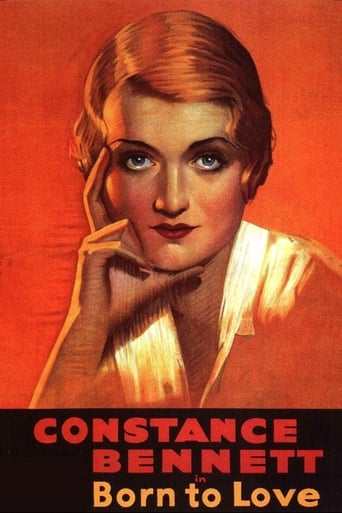JackBluegrass
This high-power weeper is notable for its photography. Made shortly after sound arrived in movies, Born to Love has some interesting images courtesy of cinematographer John Mescall. Rapid pullbacks and moving close-ups often look like the camera was mounted on a square-wheeled dolly. When done at a less frantic pace, they're much smoother and easier on our eyes. Mescall's stationary camera images of London's celebration at the end of World War One , complete with an example of his tilted camera style, are the best images in the movie. Film buffs of pre-code talkies will get something out of this very dreary story.
judy t
They don't make 'em like this anymore. But the weeper genre was popular with the ladies once upon a time, and Bennett led the pack of martyrs. Her suffering in Born to Love is all the sadder because it could have been so easily avoided if she had just answered her husband's questions frankly and fully. But not Bennett. Her evasiveness followed by her unforgivably cruel words turned this kindly man's love for her into hate. But still, she didn't deserve what she got.Variety's reviewer wrote of the plot, "Constance Bennett is ruined again and has another baby" and "How the women love it, that sobbing stuff." Bennett's hand-wringing and heavy emoting was criticized, but I thought her acting was exactly how her character would respond to the shocks the script writers threw at her. Regardless, Variety saw the film's box-office potential, "Bennett isn't much of an actress here but still drawing as ever because of this story." Only a year after this huge hit, the drawing power of Bennett and stories like Born to Love would lose favor with fickle moviegoers, and she and her producers were unable to keep her career from sliding downhill until Topper reinvented her as a sophisticated comedienne.This was Joel McCrea's first (of 4) teamings with Bennett as well as his first major role. He's wonderful to watch and Bennett's undying love for him is believable. Cavanaugh is excellent and manages to be sympathetic even while being cold-hearted and vengeful.
calvinnme
I really love Constance Bennett and Joel McCrea and their underrated talent and range, but this film was just one emotional blow after another to Bennett's character, Doris Kendall, a nurse in Great Britain during World War I, to the point where it got hard to continue watching. The film starts out on a rather fascinating note - Doris is practically hypnotized by the sight of a German dirigible in a rather strange "dogfight" with British planes over London. Down goes the dirigible in a pile of flames.Joel McCrea's character, Captain Barry Craig, pulls Doris out of danger and sparks begin to fly. At the same time, Doris is nursing an English nobleman (Paul Cavanagh as Sir Wilfred Drake) back to health from his war wounds and he has fallen in love with her. Captain Craig and Doris throw convention to the wind and spend one night together and consummate their relationship before he has to ship out to France. Then one tragedy after another ensues, some due to misunderstandings, some due to natural occurrences, and some due to divorce law in England as it stood in the early twentieth century in which one of the parties had to be the bad guy in order for divorce to occur with legally punitive measures taken against the party that is deemed to be "at fault".This movie may costar McCrea, but this is really Constance Bennett's film all the way. Frederick Kerr is particularly noteworthy as an older member of England's upper class that has a crusty exterior that hides a gooey center - he's quite sympathetic and kind to Doris. Louise Closser Hale plays his wife who also has a crusty exterior but has a heart of - well - crust. In spite of these differences in viewpoint these two older members of the cast play off one another quite well.Recommended, but not if you're looking to be cheered up.
Michael-110
Born to Love (1931) is rather silly but nevertheless is a good example of a candid treatment of divorce law before the Production Code of 1935 put a stop to serious treatment of divorce or of pre-marital sexuality. Stuck in a loveless marriage to Wilfred, a haughty English aristocrat, Doris causes Wilfred to believe she has committed adultery. The consequences to her are catastrophic.The plot is creaky and relies on numerous contrivances. The acting is highly forgettable. Nevertheless, the issues of fault-based divorce are important ones. The movie also concerns the conflict between marriage as an institution for love and fulfillment as opposed to a unemotional union designed for the mutual support of spouses and children. Needless to say, divorce law in the old days was much better adapted to the latter vision of marriage than the former.


